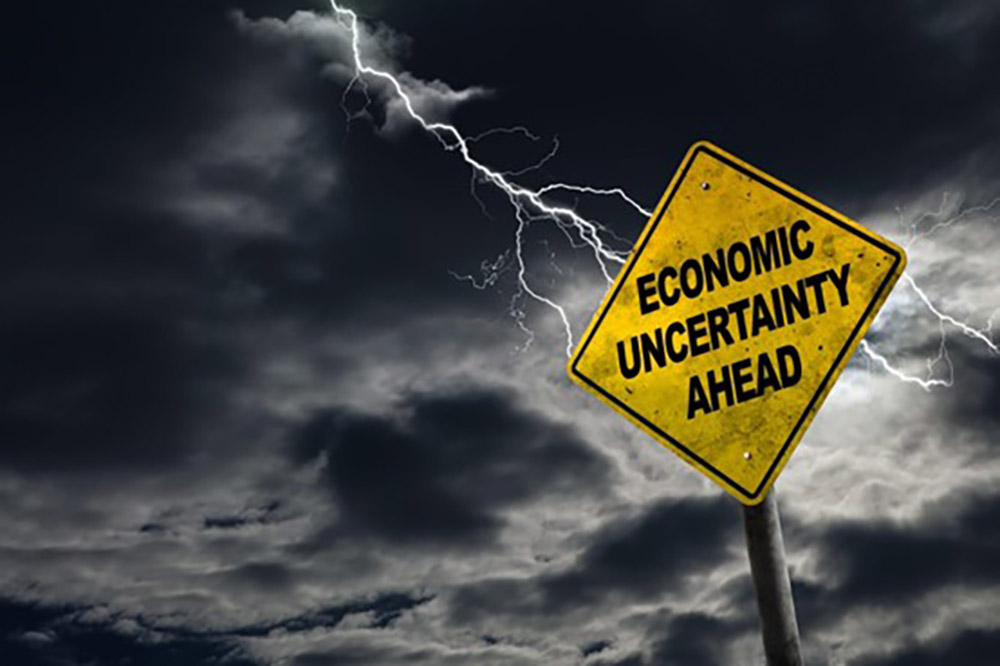
• 阿波罗全球管理公司(Apollo Global Management)指出,滞胀是增长放缓与通胀上升的结合体,而贸易战则构成“滞胀冲击”。在由该公司首席经济学家托尔斯滕·斯洛克参与撰写的最新研究报告中,该公司预测一系列事件可能引爆经济灾难。
阿波罗全球管理公司的最新报告认为,特朗普政府近期宣布的多轮关税政策,可能在2025年夏季前引发经济衰退。
根据阿波罗列举的一系列潜在事件,本月特朗普在解放日发表关税讲话后,从中国运往美国的海运集装箱已经减速。考虑到集装箱的运输周期为20-40天,因此到5月份集装箱可能停止到达美国港口。至5月中旬,这将预示着卡车运输需求骤降,随后商店库存告急。这些信号意味着春季销售疲软,零售业与卡车运输业可能在5月底至6月初开始裁员。最终在2025年夏季,美国将开始陷入全面衰退。
阿波罗的报告由首席经济学家托尔斯滕·斯洛克、副主任拉维·沙和助理施卢蒂·盖尔万卡尔共同编写。报告描绘了黯淡的经济前景,本质上是警告美国经济正因贸易冲击加速滑向衰退。
尽管特朗普的关税计划仅公布数周,预警信号已然显现。报告特别指出,贸易战会破坏供应链并降低贸易量,进而导致经济活动停滞,会形成滞胀冲击。与此同时,贸易僵局通常会导致进口商品涨价,并减少竞争。滞胀是“增长放缓或停滞+通胀攀升”的可怕组合。美国已经四十年未出现持续的严重滞胀。
阿波罗的研究报告警告称,关键商业信心指标正急速下挫,消费者反应模式更令人忧心。
CEO信心萎缩
《首席执行官》(Chief Executive)杂志的最新首席执行官信心调查显示,高管乐观情绪持续消退,62%的企业领袖预测未来六个月将出现增长放缓或衰退。
调查发现,在受访首席执行官中,预测严重经济衰退的比例从3月的9%增长至4月的14%。此外,年初约有84%的首席执行官预期收入增长,而在4月再次参与调查时,仅有49%的首席执行官预期2025年收入增长。
预期收入下降的首席执行官比例则从年初的9%激增至4月的44%。
首席执行官信心暴跌的同时,消费者乐观前景也同步崩塌。
消费者信心骤降
阿波罗首席经济学家斯洛克上周日发布的新图表显示,仅偿还信用卡最低还款额的家庭比例创历史新高。
据费城联储银行(Federal Reserve Bank of Philadelphia)披露,从信用卡余额中已表现出“消费者窘迫”的征兆。根据美联储的数据,按最低额还款的账户比例创12年新高,违约指标接近或刷新峰值。
与此同时,阿波罗的报告显示,美国民众对失业的担忧加剧。
密歇根大学(University of Michigan)社会研究所的消费者调查显示,4月消费者信心指数从3月的57骤降至52.1。该研究所主任兼经济学家乔安妮·徐在更新报告中称,约三分之二的消费者认为今年失业率将上升,这一比例是六个月前的两倍。
她补充道:“令人警惕的是,消费者越来越担忧收入前景恶化。”
密歇根大学的调查显示,预计今年收入增长的消费者不足半数,约三分之二认为未来数月他们的购买力将持续缩水。(财富中文网)
译者:刘进龙
审校:汪皓
• 阿波罗全球管理公司(Apollo Global Management)指出,滞胀是增长放缓与通胀上升的结合体,而贸易战则构成“滞胀冲击”。在由该公司首席经济学家托尔斯滕·斯洛克参与撰写的最新研究报告中,该公司预测一系列事件可能引爆经济灾难。
阿波罗全球管理公司的最新报告认为,特朗普政府近期宣布的多轮关税政策,可能在2025年夏季前引发经济衰退。
根据阿波罗列举的一系列潜在事件,本月特朗普在解放日发表关税讲话后,从中国运往美国的海运集装箱已经减速。考虑到集装箱的运输周期为20-40天,因此到5月份集装箱可能停止到达美国港口。至5月中旬,这将预示着卡车运输需求骤降,随后商店库存告急。这些信号意味着春季销售疲软,零售业与卡车运输业可能在5月底至6月初开始裁员。最终在2025年夏季,美国将开始陷入全面衰退。
阿波罗的报告由首席经济学家托尔斯滕·斯洛克、副主任拉维·沙和助理施卢蒂·盖尔万卡尔共同编写。报告描绘了黯淡的经济前景,本质上是警告美国经济正因贸易冲击加速滑向衰退。
尽管特朗普的关税计划仅公布数周,预警信号已然显现。报告特别指出,贸易战会破坏供应链并降低贸易量,进而导致经济活动停滞,会形成滞胀冲击。与此同时,贸易僵局通常会导致进口商品涨价,并减少竞争。滞胀是“增长放缓或停滞+通胀攀升”的可怕组合。美国已经四十年未出现持续的严重滞胀。
阿波罗的研究报告警告称,关键商业信心指标正急速下挫,消费者反应模式更令人忧心。
CEO信心萎缩
《首席执行官》(Chief Executive)杂志的最新首席执行官信心调查显示,高管乐观情绪持续消退,62%的企业领袖预测未来六个月将出现增长放缓或衰退。
调查发现,在受访首席执行官中,预测严重经济衰退的比例从3月的9%增长至4月的14%。此外,年初约有84%的首席执行官预期收入增长,而在4月再次参与调查时,仅有49%的首席执行官预期2025年收入增长。
预期收入下降的首席执行官比例则从年初的9%激增至4月的44%。
首席执行官信心暴跌的同时,消费者乐观前景也同步崩塌。
消费者信心骤降
阿波罗首席经济学家斯洛克上周日发布的新图表显示,仅偿还信用卡最低还款额的家庭比例创历史新高。
据费城联储银行(Federal Reserve Bank of Philadelphia)披露,从信用卡余额中已表现出“消费者窘迫”的征兆。根据美联储的数据,按最低额还款的账户比例创12年新高,违约指标接近或刷新峰值。
与此同时,阿波罗的报告显示,美国民众对失业的担忧加剧。
密歇根大学(University of Michigan)社会研究所的消费者调查显示,4月消费者信心指数从3月的57骤降至52.1。该研究所主任兼经济学家乔安妮·徐在更新报告中称,约三分之二的消费者认为今年失业率将上升,这一比例是六个月前的两倍。
她补充道:“令人警惕的是,消费者越来越担忧收入前景恶化。”
密歇根大学的调查显示,预计今年收入增长的消费者不足半数,约三分之二认为未来数月他们的购买力将持续缩水。(财富中文网)
译者:刘进龙
审校:汪皓
• Stagflation is the combination of slow growth and rising inflation and trade wars are a “stagflation shock,” according to Apollo Global Management. In a new research note coauthored by chief economist Torsten Slok, the firm predicts a sequence of events that could lead to economic catastrophe.
The recent array of tariffs the Trump administration has announced have the potential to trigger a recession by summer 2025, according to a new report from Apollo Global Management.
Based on Apollo’s potential sequence of events, shipping containers from China to the U.S. slowed down after President Trump’s Liberation Day tariff address this month. Allowing for 20-to-40 days travel time, containers shipped to U.S. ports could halt in May. By mid-May, that would portend a rapid slowdown in demand for trucking, which would be followed by less stock in stores for people to purchase. With those signs, that would mean sluggish sales in spring, while subsequent layoffs in retail and trucking could come by late May and early June. Then, in summer 2025, a full recession could take root.
The Apollo report, co-authored by chief economist Torsten Slok, associate director Rajvi Shah, and associate Shruti Galwankar, paints a bleak economic outlook and is essentially a warning that the U.S. economy is rapidly on pace for a recession due to trade disruptions.
Warning signs have already appeared even though Trump’s tariff plan was only announced weeks ago. The Apollo report specifically identifies trade wars as a source of stagflation shock because they cause economic activity to lag due to disruptions in supply chain and lower trade volumes. At the same time, the trade standoffs typically raise prices on the cost of imported goods while reducing competition. The dreaded stagflation results from a combination of slower or stagnating growth and increased inflation. There hasn’t been a sustained period of major stagflation in four decades.
The Apollo research note warns important business sentiment indicators are dropping in short order and the way consumers are responding is cause for serious concern.
Waning CEO Confidence
Chief Executive’s most recent survey of CEO confidence shows declining optimism, with 62% of top execs now predicting a slowdown or recession in six months.
CEOs surveyed who predicted a severe recession rose from 9% in March to 14% in April, Chief Executive’s monthly survey found. Furthermore, some 84% of CEOs reported anticipated revenue growth at the start of the year, while only 49% predicted that revenues would grow in 2025 when CEOs were queried again in April.
Only 9% of CEOs expected a revenue decrease at the start of the year, compared to 44% in the April survey.
A steep falloff in CEO optimism is coupled with a similar decline in a positive outlook among consumers.
Plummeting Consumer Sentiment
In a new chart on Sunday, Slok, Apollo’s chief economist, noted that a new record high share of households are only making minimum payments on credit card balances.
The Federal Reserve Bank of Philadelphia revealed that credit card balances are showing signs of “consumer distress.” The percent of accounts making minimum payments hit a 12-year high based on the Fed’s data, while delinquency metrics were close to or set new highs.
At the same time, people are increasingly worried they will lose their jobs, the Apollo report shows.
The University of Michigan’s Institute for Social Research’s Survey of Consumers saw its Consumer Sentiment Index drop to 52.1 in April, down from 57 in March. About two thirds of consumers think unemployment will rise this year, which is twice as many as six months ago, according to institute director and economist Joanne Hsu, who was quoted in an update.
“In an alarming development, consumers are increasingly worried that their income prospects may be worsening as well,” she continued.
Less than 50% think their own income will increase this year, and about two thirds believe their purchasing power will be whittled down in the coming months, the Michigan survey revealed.






